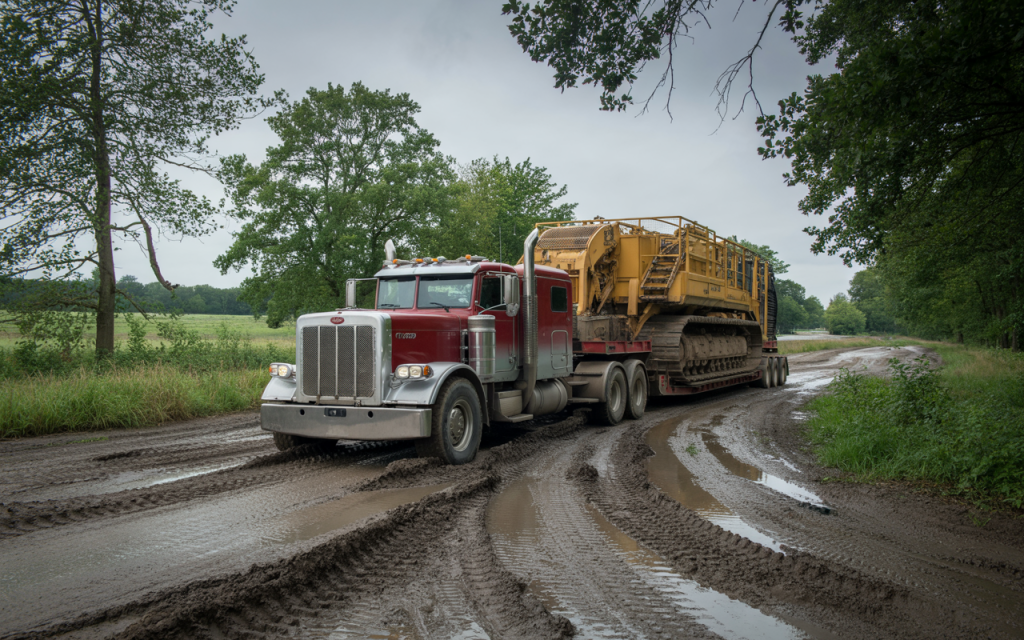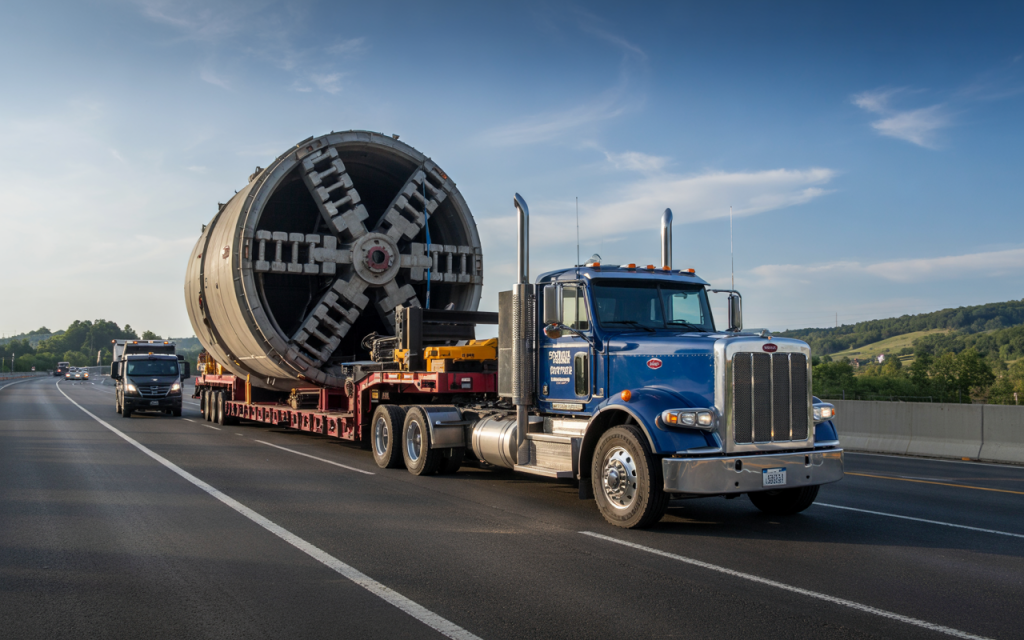Heavy Haul Trucking Challenges in Kentucky: The Challenges We Face and How We Manage Them
Freedom Heavy Haul can offer expedited Pickup and Delivery for any size shipment anywhere in the USA. Contact us today for No Hassle, No Pressure Pricing.
Heavy haul trucking in Kentucky comes with unique challenges, from strict permits to unpredictable weather and rugged terrain. We don’t just rely on horsepower — we rely on planning, compliance, and local coordination to get the job done right. Here’s how we at Freedom Heavy Haul handle and avoid the most common heavy haul challenges in Kentucky.
In this article, you will learn about Heavy Haul Trucking Challenges in Kentucky.
Regulatory Challenges and How We Manage Them
Oversize and overweight loads in Kentucky must follow specific regulations set by the Kentucky Transportation Cabinet (KYTC). We make regulatory compliance a core part of our logistics process.

How we handle it:
- We apply for the necessary permits through Kentucky’s Online Vehicle Route Planning System (OVRPS) before any load moves.
- For superloads over 160,000 lbs or extraordinary dimensions, we submit detailed route plans and coordinate with law enforcement for escorts.
- We plan for permit processing times, allowing several days for approvals, especially on complex routes.
Infrastructure Limitations Across the State
Kentucky has a mix of modern highways and aging infrastructure, including load-restricted bridges and rural roads that aren’t always built for heavy freight.
How we avoid problems:
- We use Kentucky’s GIS-based route planning tools and the Designated Extended Weight Highway Network to map compliant paths.
- When needed, we contact local KYTC district offices to identify alternative routes or coordinate detours and temporary structural support.
Geographic and Terrain Challenges
The Appalachian region and other rural parts of Kentucky include steep inclines, sharp curves, and narrow roadways that increase risks for heavy haul operations.
How we prepare:
- Our drivers are trained specifically to handle Kentucky’s diverse terrain using correct gear ratios and braking techniques.
- We schedule transport during daylight hours for better visibility and safer navigation on winding rural roads.
Weather-Related Delays and Risk Factors
Kentucky’s weather can shift rapidly — from winter ice to spring floods — creating hazardous road conditions that delay or endanger transport.

How we manage delays:
- We monitor weather and road advisories in real-time and adjust schedules accordingly.
- We at Freedom Heavy Haul factor buffer days into our delivery timeline to accommodate weather-related slowdowns.
- Freedom Heavy Haul reroutes or pause hauls when road conditions become unsafe due to flooding, snow, or severe storms.
Route Planning That Goes Beyond GPS
Oversize transport isn’t as simple as setting a GPS. We have to account for vertical clearances, tight intersections, and city traffic, especially in areas like Louisville and Lexington.
How we avoid complications:
- We plan routes that consider low overpasses, power lines, traffic signals, and tight turns.
- We coordinate with utility companies and city departments to raise or temporarily remove obstacles when necessary.
- Freedom Heavy Haul schedules travel during off-peak traffic hours to minimize congestion and safety concerns.
Load Securement and Equipment Matching
Improper load securement or using the wrong trailer type can lead to shifting, fines, or worse. That’s why we follow both federal and state securement guidelines.
How we ensure safety:
- We select trailer types based on each load — lowboys, extendables, and multi-axle platforms are used depending on the dimensions and weight.
- We follow FMCSA securement regulations, using proper tie-downs and observing working load limits.
- Our vehicles are regularly inspected, and we are prepared for roadside compliance checks.
Managing Operational Costs and Insurance
Heavy haul trucking involves significant overhead, from permits to specialized equipment and insurance.
How we control costs:
- We use route optimization tools to reduce fuel and detour expenses.
- Our insurance coverage is tailored for heavy haul freight and includes breakdown assistance, liability, and cargo protection.
- Preventive maintenance reduces downtime and mechanical failures, keeping our trucks on the road and our clients on schedule.
Coordinating for Safety and Public Awareness
Oversize loads affect more than just our drivers — they impact the public, local businesses, and emergency responders.

How we coordinate:
- We arrange certified escort vehicles to help manage traffic, signal hazards, and protect motorists.
- We notify local municipalities in advance when hauls pass through urban or high-traffic areas.
- In some cases, we issue public notices or coordinate with law enforcement to minimize disruptions and improve safety.
Building a Reliable Operation for Kentucky Hauls
Success in Kentucky’s heavy haul sector depends on experience, planning, and strong relationships with local authorities.
How we maintain long-term reliability:
- We work closely with KYTC and other state departments to ensure seamless transport logistics.
- We hire experienced drivers and route analysts who understand Kentucky’s road network and terrain.
- For especially complex projects, we partner with logistics firms that specialize in oversize freight within the state, benefiting from their local knowledge and permit-handling experience.
Frequently Asked Questions about Heavy Haul Trucking Challenges in Kentucky
Here are some questions and answers:
What qualifies as a superload in Kentucky?
Any load exceeding 160,000 lbs or having extraordinary height, width, or length. These require additional permits and planning.
How long does it take to get a heavy haul permit in Kentucky?
It can take several days, especially for superloads or complex routes. We apply well in advance to prevent delays.
Can you haul oversize loads at night in Kentucky?
Typically no. Kentucky requires oversize loads to travel during daylight hours for safety reasons.
What tools do you use for planning routes in Kentucky?
Freedom Heavy Haul relies on Kentucky’s GIS-based planning systems, OVRPS, and direct consultation with local KYTC offices.
Do all heavy haul loads need escorts in Kentucky?
Not all, but many do — especially if the load exceeds legal dimensions or travels through urban or high-risk areas.







